Eating at night in itself isn’t bad, but eating too much late at night is. If you need help with your late-night eating habit, try some of these strategies to help you stop.

Late night eating – it’s something I talk about a lot with my clients. Especially, my weight loss clients. The quick answer is no, eating late at night bad? In fact, recent evidence suggests just the opposite – that eating a small, nutrient-dense food (<200 calories) may actually have a positive effect.
What is bad, though, is eating too much at night. In fact, eating too much at any time of the day isn’t good for you. It’s just that not many people have a problem with over eating at breakfast. It’s evenings that’s are typically the problem.
Why Do People Tend To Overeat At Night?
There are many reasons why people fall into the late-night eating trap. Hunger, cravings and boredom are a few. Others may suffer from nighttime eating syndrome. Identifying the cause is the first step to finding a solution. Below are some common reasons for over-doing it at night.
Lack of structure
I can’t tell you how many of my clients report that they do great all day long, then fall off track in the evening. It’s a very common scenario and one that can definitely be fixed.
The fact is, evenings tends to be less structured than the daytime. Many people eat the same thing for breakfast often, are good eating only what they packed for lunch, and are busy working – not thinking about food or hunger. The problem comes once work ends. You’re no longer focused on work, and you walk into a house filled with food when you’re starving. Especially if you cabinets are filled with tempting goodies. If you don’t have a plan in place on how your evening eating will go, you’re leaving up to your taste buds and your hunger to decide. And, that’s never a good thing.
Not Eating Enough During The Day Or Restricting Carbohydrates
Picture this – you eat eggs for breakfast, a chicken salad for lunch, then a few nuts for a snack. You feel fantastic for sticking to your plan. For dinner you have a piece of grilled salmon and some asparagus. Still feeling good. Later that night, you’re hungry, and you’re craving something sweet. You enter the kitchen searching for something. You decide one cookie won’t hurt. Until you realize that eating one cookie made you want another. And, another. Before long, you’ve eaten more carbohydrate calories in 30 minutes than you’ve eaten all day long.
Sound familiar? If you can relate, you’re not alone. Knowingly, or unknowingly, restricting carbohydrates during the day can lead to craving them in the evenings. The problem is, the evening hours are when you are less structured and less capable of keeping control. You would have been better of eating the 3 cookies for breakfast, and the eggs at night.
The Circadian System Prompts Us To Eat
Aside from eating habits, our bodies internal clock could play a role, too. A study published in Obesity found that the circadian system prompts us to reach for sweet, salty and starchy foods in the evening hours. The average peak in hunger was around 8:00 pm.
While possible, it’s a bit too soon to blame our internal clock for our late night eating. The study involved only 12 participants, and didn’t evaluate hormonal markers of hunger and appetite. Larger studies will need to be completed showing similar results, before we can say for sure.
Boredom And Mindless Eating
Here’s another common scenario that could lead to late night eating. You had a long day of work, you barely had time to sit down and you hardly ate anything. You had a healthy, balanced meal when you got home, and know you’re ready to unwind. You turn on the TV, grab some snacks, and start munching.
Eating while participating in mindless activities, such as watching TV, can easily lead to overeating, even if you didn’t plan on it or your weren’t hungry. It’s hard to keep track of how much you’re eating when you’re not focused on your food.
Tips To Avoid Overeating At Night
Do any of those scenarios sound like you? If so, I’ve got some strategies to help. Ditch late-night eating habits for good by adopting these healthy living strategies.
Create A Balanced Meal Plan Throughout the Day
Food is meant to fuel our body – the brain, body and activities. Don’t wait until your day is winding down to provide your body what it needs. Start your day with a big breakfast and
Provide your body the food it needs to stay focused and energized all day long. That means meals that include carbohydrates, protein and some healthy fats. Including all of the food groups helps prevent cravings and helps you to get the wide variety of vitamins and minerals that you need, all while keeping you full and satisfied all day long. If you’re not sure how to get started, check out my post on how to create a balanced meal plan.
Ditch Dieting
Following a strict diet or avoiding your favorite foods can cause you to overthink about food and eating. And that’s not good for you physiologically or psychologically. Make sure your balanced eating plan is filled with foods that you love – not diet foods. Losing weight, and ultimately keeping that weight off, requires you to follow an eating style that you can maintain for the long term, not until you get sick of it!
Portion Your Snacks
Eating a small, nutrient-dense snack at night is not a bad thing, so if you want one, have one. Just be sure to eat it mindfully and with portion control in mind. Rather than eating from the bag, put one serving onto a plate and eat it while sitting at the table. If you practice portion control, you remain in control. Even if you do watch a movie while eating, if you portioned it correctly, and can control going back for seconds, you won’t overdo it. The key is being honest with yourself on whether or not you can control how many portions you eat!
Find Healthy Replacements
Often, late night eating is a habit, and nothing more. If you have spent years of your life snacking at night, even if you weren’t hungry, it’s going to take more than wanting to stop to change. You need to find a replacement hobby to keep you occupied until you no longer think about eating. Instead of grabbing a snack, take a walk outside, call a friend, read a book or listen to a podcast. Anything to keep you from walking into the kitchen and grabbing snacks.
Do you have another strategy to helps prevnt you from eating at night? Share it in the comments below.



 Hi, I’m Heather – a registered dietitian, busy mom, consultant, adventure junkie and travel addict who has mastered living healthy on the go. My blog is where I share simple recipes and healthy living tips to help and inspire others to live their best life.
Hi, I’m Heather – a registered dietitian, busy mom, consultant, adventure junkie and travel addict who has mastered living healthy on the go. My blog is where I share simple recipes and healthy living tips to help and inspire others to live their best life.